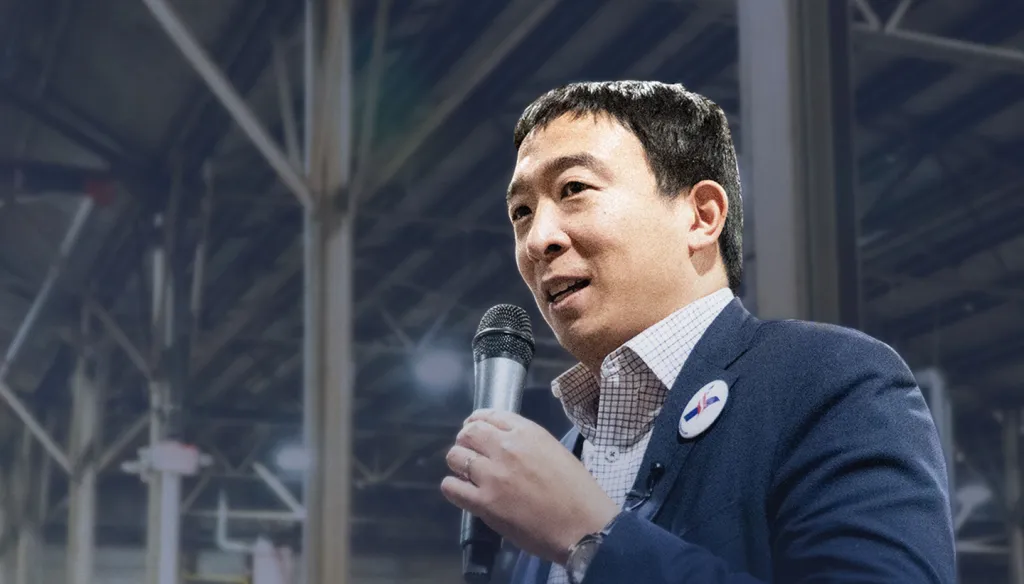Andrew Yang proposes crypto regulation according to a blog post on his campaign website. Andrew Yang is one of the Democratic Candidate Hopefuls for the 2020 US presidential elections.
Andrew Yang has garnered the attention of a lot of tech-oriented voters because of his open advocacy of new technologies, especially blockchain and cryptocurrencies. He promises that the election software will be made on a blockchain if he becomes president.
Yang explained that cryptocurrencies and digital assets already compose a great deal of economic activity. The governmental response has lagged. “A national framework for regulating these assets has failed to emerge, with several federal agencies claiming conflicting jurisdictions,” he said.
In his broader plan to regulate the tech industry and protect U.S. citizens from big tech companies “that are prioritizing profits over our well-being,” Yang promises to promote legislation on the crypto asset market space by defining what a token is, when a token is a security, and clarify the tax implications of owning, selling, and trading digital assets, among others.
From his blog post
The advancement of technology in America has driven the advancement of humanity nationally and globally. But technology has also outpaced our government’s understanding of it, and regulations are falling short of protecting us from Big Tech companies that are prioritizing profits over our well-being.
Today, we live in a hyper-connected environment, led by these tech companies, that has impacted our culture, lifestyles, families, and politics. The culture of innovation and the quality of human capital in America has fostered the growth of this industry over the past couple of decades to create trillion-dollar tech companies, in a framework of self-regulation.
But the benefits these services have given us have begun to clash with the wellbeing of society.
Big Tech companies are the winners of the 21st century economy. They’ve amassed too much power, largely profiting from our personal data, and unaccountable responsibility—we have reached a point where the government needs to step in. And we’re starting to take notice, with about 50% of US adults favoring more regulation on tech firms. These companies themselves are asking for regulation (until you propose specifics).
Unfortunately, our government is unequipped to handle it. We dissolved the Office of Technology Assessment in 1995. Recent hearings with tech CEOs like Mark Zuckerberg exposed the lack of basic understanding of technology by members of our Congress.
Digital giants such as Facebook, Amazon, Google, and Apple have scale and power that renders them more quasi-sovereign states than conventional companies. They’re making decisions on rights that government usually makes, like speech and safety. Their business models are predicated on keeping people engaged, driven by algorithms that are supercharged by technology to predict our behavior, such as artificial intelligence and machine learning, and that feed off of our data, creating an increasing asymmetry of power without any accountability.
The most concerning of all is the effect technology and social media platforms are having on our kids. Technology, smartphones, and tablets are ubiquitous. Our kids have access to them from infancy. They’re getting hooked, from a young age, on apps and platforms that function as dopamine slot machines, potentially destroying the psyches of a generation. It’s affecting our kids’ mental and physical health, contributing to obesity, sleep deprivation, posture issues, stunting social skills, and blurring the lines between real and virtual relationships. It’s time to take action.
We need to come up with 21st century solutions to these problems.
My approach is four pronged:
Regulate the use of data and privacy by establishing data as a property right. The associated rights will enable individuals to retain ownership and share in the economic value generated by their data.
Minimize health impacts of modern tech on our people, particularly our children. I will create a Department of the Attention Economy that focuses on smartphones, social media, gaming, and apps, and how to responsibly design and use them, including age restrictions and guidelines.
Stop the spread of misinformation that is eroding trust in our institutions and fanning the flames of polarization in our society. I will scale up VAT on digital ads to hasten a shift away from ad-driven business models, require disclosures on all ads, regulate bot activity, and regulate algorithms, addressing the grey area between publishers and platforms.
Adopt a 21st century approach to regulation that increases the knowledge and capacity of government while using new metrics to determine competitiveness and quickly identifies emerging tech in need of regulation.
Applying 20th century solutions to 21st century problems is not the right way to go. Measures such as breaking up big tech companies to foster competition wouldn’t necessarily address the fundamental problems. Breaking up Google into 5 mini-Googles wouldn’t change much as people don’t want to use the fourth best search engine. Network effects would eventually turn out a dominant player. That’s why we are taking a modern approach.
This is a New Way Forward.
1. Data as a Property Right, and Increased Privacy Protections
2. Minimize health impacts of modern tech on our people, especially our children
3. Stop the spread of disinformation
4. A modern approach to antitrust and regulation requires a 21st century framework
-Andrew
Andrew Yang proposes crypto regulation, read the full blog post here.



